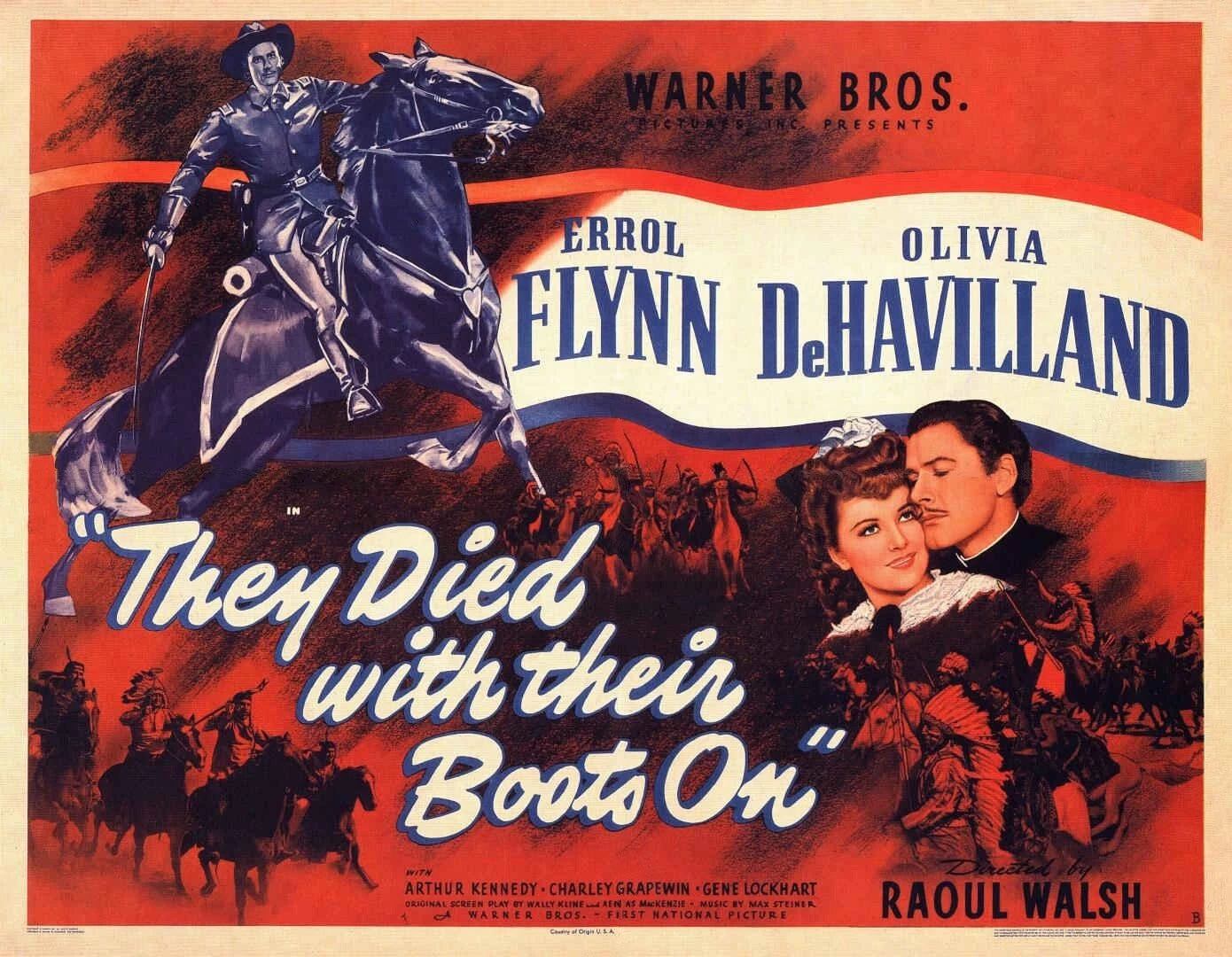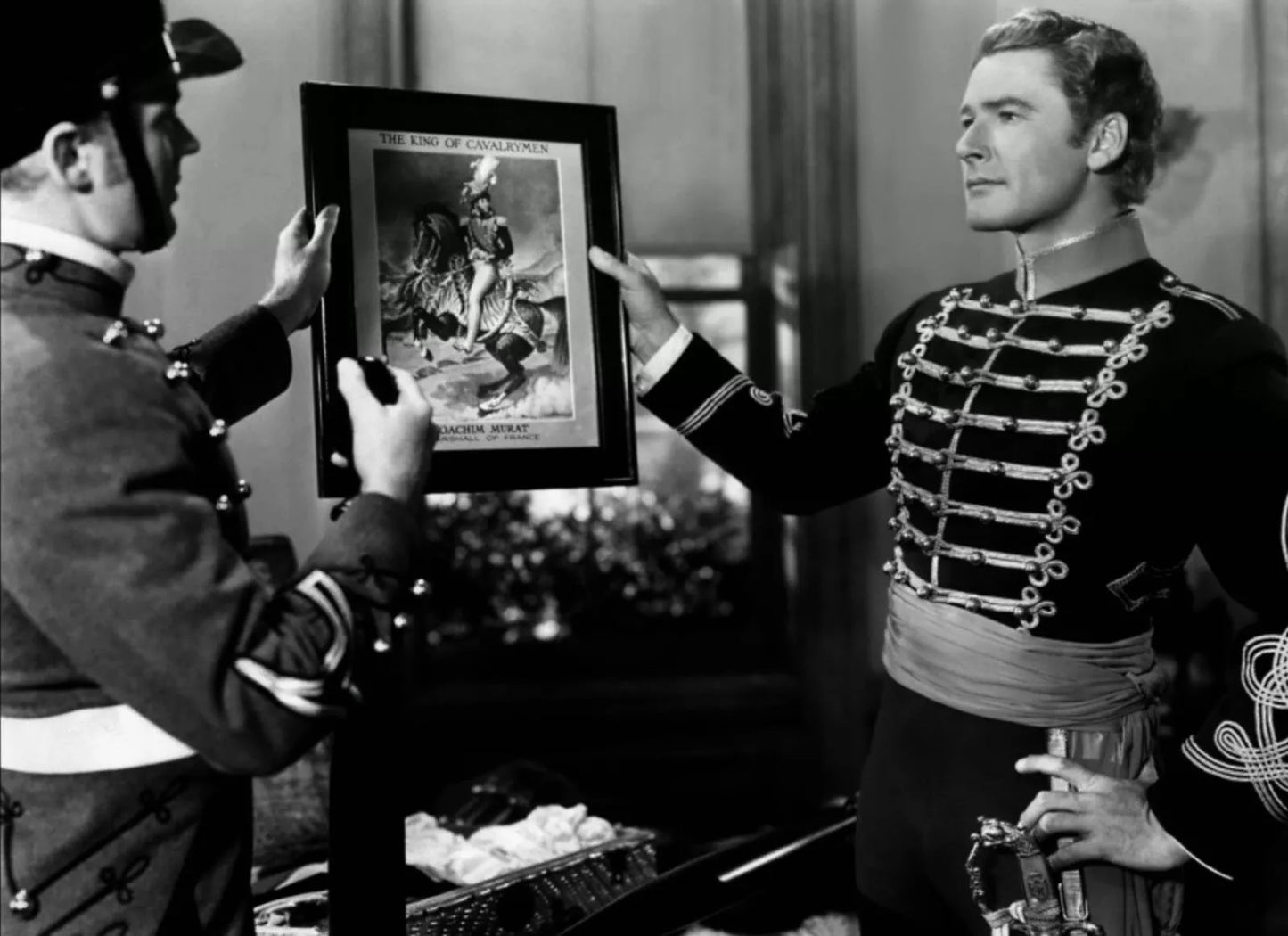MadeAgainGills Online Media
They Died With Their Boots On (1941) - Public Domain DVD NO CASE
They Died With Their Boots On (1941) - Public Domain DVD NO CASE
Couldn't load pickup availability
THEY DIED WITH THEIR BOOTS ON (1941) - DVD - Starring - Errol Flynn,Olivia de Havilland - Public Domain Movie Disc only Free Post - Black & White - Region Free
They Died with Their Boots On is a 1941 American Biographical western film from Warner Bros. Pictures, produced by Hal B. Wallis and Robert Fellows, directed by Raoul Walsh, that stars Errol Flynn and Olivia de Havilland.
The film's storyline offers a highly fictionalized account of the life of Gen. George Armstrong Custer, from the time he enters West Point military academy through the American Civil War and finally to his death at the Battle of the Little Bighorn. Custer is portrayed as a fun-loving, dashing figure who chooses honor and glory over money and corruption. The battle against Chief Crazy Horse (played by Anthony Quinn) is portrayed as a crooked deal between politicians and a corporation that wants the land Custer promised to the Native Americans.
The film was one of the top-grossing films of 1941. They Died with Their Boots On was the eighth and final film collaboration between Errol Flynn and Olivia de Havilland in starring roles, although the two would guest star together in Thank Your Lucky Stars (1943). The supporting cast features Arthur Kennedy, Sydney Greenstreet as Lt. Gen. Winfield Scott, Anthony Quinn as Crazy Horse, John Litel as Gen. Phillip Sheridan, Regis Toomey as Fitzhugh Lee, Joseph Crehan as President Ulysses S. Grant, and Hattie McDaniel.
George Armstrong Custer (Flynn) arrives at West Point in an outlandish uniform he had designed himself, which makes him appear to be a visiting foreign general. Following the misunderstanding, he signs as a cadet and begins to stack up demerits for pranks and a general disregard for rules while at the Point. When the Civil War breaks out, Custer is at the bottom of his class.
Custer is walking a silent punishment tour when he is approached by Libbie Bacon who asks him for directions. Shortly thereafter, his punishment ends, and he runs after her, explaining his rude silence, and asking if he may come to call that evening. Later, Custer and other members of his class are graduated early and ordered to report immediately to Washington, D.C., for assignment. As a result, Custer misses his appointment with Libbie.
Custer makes the acquaintance of Gen. Winfield Scott (Sydney Greenstreet), who aids him in getting placed with the 2nd U.S. Cavalry. He becomes a war hero after disregarding a superior's orders during a crucial battle, successfully defending a bridge for the Union infantry. Awarded a medal, he gets leave to return home to Monroe, Michigan. He meets Libbie at her home, but her father, who has been the butt of Custer's joke earlier that day, orders him to leave. Custer returns to his regiment. Due to a miscommunication from the Department of War, he is promoted by mistake to the rank of brigadier general and takes command of the Michigan Brigade at the Battle of Gettysburg. He wins the day, and many victories follow thereafter.
Upon returning home to Monroe as a Union war hero, Custer marries Libbie in a lavish ceremony with a full honor guard, but soon grows bored with civilian life and begins drinking too much. Libbie visits Custer's old friend Gen. Scott and begs him to assign Custer to a regiment again. He agrees, and Custer is given a lieutenant colonel's commission out west in the Dakota Territory.
When Custer and Libbie arrive at Fort Lincoln, Custer finds the soldiers a drunken, rowdy, and undisciplined lot in need of firm leadership. His old West Point enemy, Ned Sharp (Arthur Kennedy), who has a government license to run the fort's trading post and saloon, is providing Winchester repeating rifles to the local Native Americans. Furious, Custer stops the rifle sales and permanently closes the saloon. He then instills proper military discipline in his men and introduces a regimental song, "Garryowen", both of which quickly bring fame to the U.S. 7th Cavalry under Custer's command. The 7th has many engagements with Lakota tribal chief Crazy Horse (Anthony Quinn), who eventually offers peace, wanting a treaty that will protect the sacred Black Hills; Custer and Washington sign the treaty, but soon it is bankrupting Sharp's trading posts. Sharp and several others spread a rumor that large gold deposits have been discovered in the Black Hills. American settlers stream into the area in violation of the treaty, but Custer and his troops permit no infractions. To embarrass Custer, Sharp passes out free bottles of liquor to Custer's men hours before they drunkenly pass in revue, in complete disarray, before Commissioner Taipe, a politician in league with Sharp. Custer punches both Sharp and the commissioner in anger, and he is quickly relieved of his command.
On the way to Washington for his Court martial Custer hears from Libbie about attempts to start the gold rush in the Black Hills and realizes from the timing that it has been fabricated, a plan that would bring much business and large profits to a select group. Outraged, Custer takes the information to the U.S. Congress, but they only ridicule him, refusing to hear his evidence. When news arrives that the presence of gold miners has led to open conflict between the Lakota and U.S. troops, Custer appeals in person to President Ulysses S. Grant, one soldier to another, who restores him to command.
Upon returning to Fort Lincoln, Custer comes to realize that his band of cavalry are the only chance at rescuing a force of U.S. infantry from the Lakota. He also knows full well that he and his men have little chance of survival against their force. Custer has a final, emotion-filled goodbye with Libbie, after which he leads his cavalry into battle. An even greater number of Native American tribes, numbering 6000, have come together and joined the conflict. Quickly surrounded, Custer and his meagre forces are killed.
A few corrupt politicians have now goaded the western tribes into war for personal profit, threatening the survival of all white settlers in the Dakota Territories. Custer and his men have given their lives at the Battle of the Little Bighorn in order to slow the Native American advance. A letter left behind by Custer with Libbie, now considered his dying declaration, names the culprits and absolves the Native Americans of all responsibility; Custer wins his final campaign.
140 Mins
Please note this DVD movie is over 50 years Old and in Black & White, it will not be up to today's high Quality, although the Quality is very good and can be watched on a large screen. Please remember it was made for the older screens though and not digital.
ALL DVD-R's ARE MADE TO PLAY IN ALL DVD/BLURAY PLAYERS, PC'S AND ARE REGION FREE
All our items are reproduced on high quality disks (DVD-R) by ourselves and are of a very good quality and have been thoroughly checked in the Public Domain before listing.
All our products are either in the public domain and/or we have collected and compiled them ourselves and therefore are the copyright holders and master re-sellers or we own the resell rights to them.
Items contained on this DVD are distributed freely and globally under the terms of the GNU Public Licence and the GNU Lesser General Public Licence (LGPL).
High Quality Printed DVD-R in Plastic Wallet not a DVD Case.
Share




